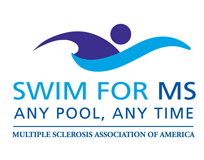Research on individuals with multiple sclerosis (MS) suggests that aquatic exercise is effective for improving flexibility and range of motion, cardiovascular endurance, fatigue level, muscle strength, mobility function (including gait and balance), quality of life, and psychological wellbeing. In addition, no study reviewed has identified an increase in relapses or reported any other adverse change in neurologic status.
The topic of aquatic exercise is as broad and varied as the individuals with MS who might want to participate. The aquatic environment offers numerous techniques and options for exercise participation for all levels of physical abilities. Whether you are interested in a high-level aerobic workout, moderate cardio/strength training, or gentle, slow-moving form, aquatic exercise can be adapted to all levels of MS and provide you with a wide variety of safe, effective and enjoyable ways to exercise. Individuals are urged to consult their physician prior to the start or change of any exercise program or routine.
In this section of MSAA’s Swim for MS Aquatic Center, you will:
- Discover how the properties of buoyancy, viscosity and other factors create a supportive, reduced-gravity exercise environment
- Learn about the different types of aquatic exercises that can be adapted to a wide-range of ability levels
- Find out how to select an appropriate pool facility and qualified aquatic fitness instructor
Aquatic Therapy and Aquatic Exercise – What are the Benefits for People with MS?
Article from MSAA’s national magazine, The Motivator, Summer/Fall 2012
 Aquatic Exercise and Multiple Sclerosis: A Guide for Patients
Aquatic Exercise and Multiple Sclerosis: A Guide for Patients
View/Download PDF
Order a free copy of this publication
 Introduction to MS Aquatic Fitness
Introduction to MS Aquatic Fitness
View online video
Order a free copy of this DVD

















